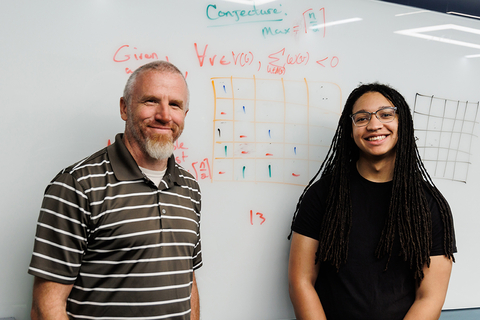Jean-Pierre Appel ’24
Major: Pure Mathematics; Minor: Computer Science
Projects: “Network Reliability Parameters” and “Exploring Toggle Games on Graphs”
Advisor: Nathan Shank, professor of mathematics
Jean-Pierre Appel’s participation in two mathematics SOAR projects taught him a valuable lesson: not every math problem has been solved.
“Math courses often give the illusion that every problem has been solved.I learned that could not be farther from the truth,” Appel says.
Appel ’24 took part in two projects to explore the field of discrete mathematics and computer science. For the first project, “Network Reliability Parameters,” he and his team looked at various properties that could cause a network failure. They first studied the number of connections that would have to be removed to guarantee that the size of the largest cycle was less than a chosen value, but then they switched gears. The team focused on the number of connections that had to be removed to increase the total domination number by any value for certain network configurations.

“We ended up finding that the initial question we posed had already been answered. It was an educational experience, changing our topic partway through our research,” Appel says.
His second project involved diving into the specifics of the game Lights Out. He and his team, advised by Professor of Mathematics Dr. Nathan Shank, looked at a generalization of this game on Toggle. Toggle is a two-player game with zero randomness in which the winner is determined only by the graph. Although optimizing the computer program was difficult, according to Appel, through their research the team proved which player had a winning strategy for certain graph configurations.
Both projects were inspired by real-world phenomena, Appel says. Currently, he and the team hold weekly meetings to continue their work and finalize their findings, with the goal of publishing a paper.
Outside of SOAR, Appel has been proactive in presenting this research to various entities. The team has already displayed a poster at the Mathematical Association of America’s MathFest in Tampa, Florida, and has been accepted to present their research at the SACNAS National Diversity in STEM conference in Portland, Oregon. This project was cosponsored by the Office for Diversity, Equity, and Inclusion.
